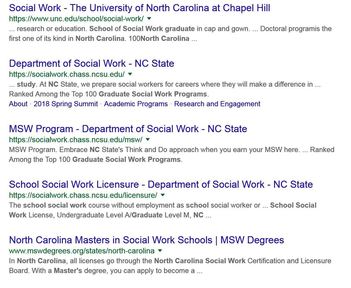First, think realistically about what limiting factors you might have in choosing your graduate program. Can you move anywhere in the country, or do you have geographic limitations (e.g., want to be within three hours’ drive of your family; have a partner who has to find work in a specific city; prefer to live in a big city or a small town; know you want to settle in CT forever)? If you have no geographic limitations you will have more possibilities for finding an ideal fit, but it doesn't make sense to look at programs that fall outside of your expectations of where you will live if you do have geographic limitations. If you are interested in programs that are very competitive (like clinical PhD programs, for instance), you might want to consider a broader geographic search. Perhaps you and your partner can live a couple of hours apart for a couple of years. In addition, think of your financial limitations. Do you have parental or other money to support your time in school, or will you have to take out loans? If you're going into a career like social work, you are unlikely to have a huge salary right after graduation, so considering the cost and what you can afford in loans after you finish is important. Programs can vary greatly. For 2018-2019, full time MSW tuition at NYU is $46,266; at Southern Connecticut State it is $12,143 in state, $24,487 out of state. Over the two-year degree that could be a difference of $60,000.
Once you have a sense of the type of program you want and any limiting factors you may have, you can start to research specific programs. Obviously, the Internet is a great source for finding out about programs (picture me, in 1991, sending letters to 30 psychology PhD programs, and then waiting for them to send me brochures about each program, and having those brochures take over my bedroom in piles of Yes/No/Maybe, and you'll start to realize what a truly great resource the internet is for this task!). There are different places you can look. US News & World Report ranks some types of programs, and so it can be a useful place to look. Let’s say I know I’m staying in North Carolina, and I’m interested in an MSW. It gives me 12 MSW programs in North Carolina. gradshools.com can sometimes be helpful. You can narrow your search down by discipline (e.g., social work), and then, if you'd like, state and/or city. If you're not interested in an online degree, make sure to check "campus" as one of the options. It is very important to note, though, that universities have to pay to advertise on gradshools.com, so you will not find every program there. Also note that there are a lot of other websites that compile graduate school information, and they may or may not charge to be listed – just be a bit careful when you are searching, as the listing could be incomplete or the information inaccurate. When I did the North Carolina MSW search on gradschools.com, I came up with only 5 programs.
You can also visit the websites of professional organizations. For instance, the American Association for Marriage and Family Therapy has a directory of training programs that lists US and Canadian programs.
Another option is a general google search. For instance, "graduate school North Carolina social work." When you do so, you will get a lot of different websites like gradschools.com, that try to compile lists of programs. You will also get a lot of ads for online programs.
When you look at specific programs, read their website carefully, and look for some of the following components (what you look for is going to vary by what kind of program you're considering):
- How do they describe their philosophy? What is their mission statement?
- What areas of specialization/emphasis do they describe, if any?
- What type of careers do they describe their graduates going into?
- How research focused is the program?
- Do they provide any information about the ranking of the program?
- Are they accredited?
- What courses do they offer? Do these courses match your interests?
Also consider talking to people you know. Talk to your professors, people where you work, other students. You may find someone who knows someone at a specific program, or knows about a specific program. Firsthand experience can provide information you may not find on a web site.
Throughout this process, the important thing will be finding the program that's right for you. Be realistic about your qualifications. If you don't have the highest GPA, consider programs that are not the highest ranked programs. If you're not certain whether you want to do community work or private practice, or work with children or adults, make sure you select a program that trains in both.
Also, be careful to determine the licensing regulations and requirements. Different types of degrees have different licensing requirements, and sometimes they're state specific. Some states have sharing rights for licenses, others do not. Consider these issues carefully when you decide where you want to train, and where you want to live afterward.
The better idea you have of what you want when you start this process, the easier it will be to narrow down your choices. That said, even if you start out with little sense of how to narrow things down, reading about all of the different programs will likely help you figure out what you do and don’t want in a program. Just like reading all those hard copy brochures in 1991 helped me – and you’ll harm fewer trees in the process.
“How to choose a graduate program first appeared on Eva Lefkowitz’s blog on October 16, 2018.”



 RSS Feed
RSS Feed
